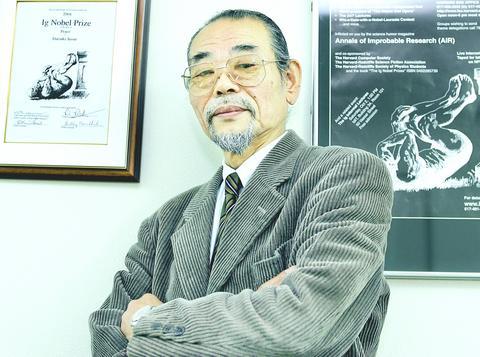Daisuke Inoue could be a billionaire if he had only filed a patent for his invention three decades ago -- the karaoke machine, which has opened up the prospect of stardom, however fleeting, to millions of musical wannabes.
Instead, the man whose creation has become a US$7.5 billion-a-year industry in Japan alone has designed gadgets to wash clothes and kill insects as he tries to put his finger on the next sensation.

PHOTO: AFP
Now aged 64, Inoue said he came up with the device that would become a worldwide social lubricant when he was a fumbling keyboardist accompanying customers at a club in the western Japanese city of Kobe.
"A driving force [for the invention] was my laziness as it was hard to master new songs one after another," Inoue told reporters in an interview.
Inoue, with a smooth deep voice, graying slicked-back hair and a ponytail, has never been able to read music even though he started earning money as a drummer when he was 16.
"Accompanying tone-deaf singers was no problem. What was toughest for me was to remember by heart several new songs every month because I couldn't read music," said the inventor of karaoke.
Inoue first got the idea for a karaoke machine in 1971 after a club customer asked him to join him on a weekend company trip as he wanted to sing to Inoue's keyboard. Inoue could not skip work at the club, so he made a tape of instrumental music for him.
Later that year, he invented the original karaoke machine, called "8 Juke," based on a car stereo and equipped with a microphone, amplifier and coin box that played music recorded on eight-track cartridge tapes. Inoue was 31 at the time.
The machine proved to be an instant hit.
Though rival devices by firms such as Daiichikosho, now the top karaoke company, appeared within three years, Inoue saw 12 good years selling tape-based karaoke machines.
His company's fortune waned with emerging laser disc-based machines in the mid-1980s. He survived by turning the company from a karaoke machine maker to a trading firm.
"I went to Daiichikosho with which we had been battling fiercely and asked them to let us handle their machines," Inoue said.
His company came to boast annual sales of ?10 billion (US$95 million). But the lifestyle proved too much for Inoue.
"It was luxury-induced depression. I had been a salesman talking directly to customers but was suddenly given a monthly salary of ?3.5 million and no real job," he said.
"I began to suffer head-aches and was unable to move to go to office," he said, recalling the months in the early 1990s he served as nominal "chairman" of the company.
He broke out of his depression by leaving the company, running around with his dogs and establishing an industry group to promote his invention, the All-Japan Karaoke Industrialist Association.
His latest invention is the "New Aqua Trio" pot which is purported to electrolyze water for washing laundry, cleaning dishes and even rinsing mouths without detergent or chemicals.
Costing ?399,000 (US$3,800), the home-use pot is touted to bring about "a cleaning revolution."
And this time, Inoue has wisely decided to patent the product, both in Japan and internationally.

Sweeping policy changes under US Secretary of Health and Human Services Robert F. Kennedy Jr are having a chilling effect on vaccine makers as anti-vaccine rhetoric has turned into concrete changes in inoculation schedules and recommendations, investors and executives said. The administration of US President Donald Trump has in the past year upended vaccine recommendations, with the country last month ending its longstanding guidance that all children receive inoculations against flu, hepatitis A and other diseases. The unprecedented changes have led to diminished vaccine usage, hurt the investment case for some biotechs, and created a drag that would likely dent revenues and

Global semiconductor stocks advanced yesterday, as comments by Nvidia Corp chief executive officer Jensen Huang (黃仁勳) at Davos, Switzerland, helped reinforce investor enthusiasm for artificial intelligence (AI). Samsung Electronics Co gained as much as 5 percent to an all-time high, helping drive South Korea’s benchmark KOSPI above 5,000 for the first time. That came after the Philadelphia Semiconductor Index rose more than 3 percent to a fresh record on Wednesday, with a boost from Nvidia. The gains came amid broad risk-on trade after US President Donald Trump withdrew his threat of tariffs on some European nations over backing for Greenland. Huang further

CULPRITS: Factors that affected the slip included falling global crude oil prices, wait-and-see consumer attitudes due to US tariffs and a different Lunar New Year holiday schedule Taiwan’s retail sales ended a nine-year growth streak last year, slipping 0.2 percent from a year earlier as uncertainty over US tariff policies affected demand for durable goods, data released on Friday by the Ministry of Economic Affairs showed. Last year’s retail sales totaled NT$4.84 trillion (US$153.27 billion), down about NT$9.5 billion, or 0.2 percent, from 2024. Despite the decline, the figure was still the second-highest annual sales total on record. Ministry statistics department deputy head Chen Yu-fang (陳玉芳) said sales of cars, motorcycles and related products, which accounted for 17.4 percent of total retail rales last year, fell NT$68.1 billion, or

MediaTek Inc (聯發科) shares yesterday notched their best two-day rally on record, as investors flock to the Taiwanese chip designer on excitement over its tie-up with Google. The Taipei-listed stock jumped 8.59 percent, capping a two-session surge of 19 percent and closing at a fresh all-time high of NT$1,770. That extended a two-month rally on growing awareness of MediaTek’s work on Google’s tensor processing units (TPUs), which are chips used in artificial intelligence (AI) applications. It also highlights how fund managers faced with single-stock limits on their holding of market titan Taiwan Semiconductor Manufacturing Co (TSMC, 台積電) are diversifying into other AI-related firms.